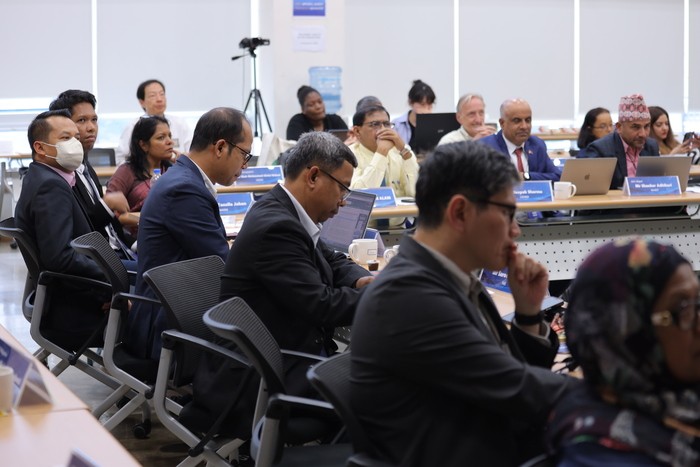Sharing of Achievements and Challenges by the Partners: GCED Curriculum Development and Integration Project (GCED CDI) and Global Citizenship Cooperation Centre (GCC) Consultation Meeting 2024
25.09.2024 | apceiu-cdi | 85 reads
The GCED Curriculum Development and Integration Project (GCED CDI) and Global Citizenship Cooperation Centre (GCC) Consultation Meeting 2024 (hereinafter referred to as ‘GCED CDI/GCC Consultation Meeting 2024’) was held on 4-7 September, together with the 9th International Conference on Global Citizenship Education (9th IConGCED).
The event consisted of two parts: Part 1. Capacity Building and Knowledge Sharing on GCED (4-5 September), and Part 2. Technical Consultation Meeting on GCED CDI/GCC Project (6-7 September). Held in conjunction with the 9th IConGCED, Part 1 aimed to broadly share the achievements of the GCED CDI and GCC Projects of our partner countries and enhance the capacities of key stakeholders. Part 2 was dedicated to sharing the progress and outputs of the Project in each partner country, discussing the challenges, lessons learned and future plans.
During the 9th IConGCED in Part 1, delegates from Ghana, the Philippines, Lao PDR and Malaysia - partner countries that have demonstrated successful outcomes in the Project - showcased their practical experiences and actions for advancing GCED as speakers. The speakers included Genevieve Mensah from the National Council for Curriculum & Assessment (NaCCA) in Ghana, Rowena Hibanada from GCC-Philippines, Kiengkay Ounmany from GCC-Lao PDR, and Chen Yoke Pin from Arts-Ed in Malaysia.
On September 6, Part 2 of the GCED CDI/GCC Consultation Meeting 2024 took place at APCEIU. The meeting brought together GCED CDI Project partners and GCC partners to present their activities, strategies, achievements, challenges, and future plans for implementing and disseminating GCED. The meeting held special significance with the participation of new partners, such as Uzbekistan, which will join the GCED CDI Project for its 6th round (2025-2027), and Nepal and Bangladesh, which are set to operate the Cooperation Centre from this year (2024-2028).
The morning session featured an information briefing on the GCED Monitoring Survey, co-presented by Jeongmin Eom from APCEIU and Professor Hwanbo Park from Chungnam National University. This survey aims to assess the current status of trainees’ (teachers/trainers’) capacity for GCED and improvement through the workshops by GCCs, and to provide tools for evaluation and monitoring.
In the afternoon, the meeting commenced with opening remarks by Hyun Mook Lim, the director of APCEIU, and congratulatory remarks from Peter K. Ngure, the Permanent Delegate of Kenya to UNESCO. In his speech, the Kenyan Ambassador acknowledged the efforts of APCEIU in promoting GCED worldwide and recognized Kenya's achievements as a 2nd Round country of the GCED CDI Project (2019-2021) with support from APCEIU.
Presentations for the GCED CDI Project were delivered by Bangladesh, Bhutan, Ghana, and Malaysia, who are concluding their third year of the project. These were followed by presentations from Thailand and Pakistan, who have recently embarked on their project involvement. Each country delegation shared their progress, outcomes, lessons learnt and obstacles to overcome.
Subsequently, GCC partners presented their goals, approaches, and efforts to strengthen the capacity of teachers and teacher trainers. Thailand, Malaysia, Cambodia, the Philippines, Indonesia, and Laos highlighted their achievements and challenges. Bangladesh, which recently launched its activities under the National Academy for Educational Management (NAEM), discussed initial outcomes as well as difficulties such as workload and system complexity. Nepal, still proceeding with its cooperation agreement with APCEIU, focused on its strategies and anticipated challenges, including insufficient teacher readiness for training. A Q&A session after the presentations allowed participants, especially those in the early stages of their projects like Nepal and Bangladesh, to seek advice and exchange ideas with more experienced partner countries.
On September 7, individual consultations were conducted with the Nepalese and Uzbekistani delegations to help understand the overall project progress and refine future activities and strategies.
 |
The four-day event facilitated networking among partner countries, fostered discussions on common challenges they are facing, and served as a platform for sharing diverse ideas and insights to advance and expand global citizenship education.
